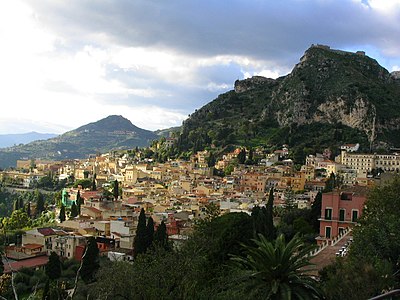TAORMINA
Facing the Ionio Sea, along
the Eastern coast of Sicily, is where you will find Taormina,
offering precious and breathtaking panoramas in the presence
of Etna, which is situated only a few kilometres from here.
The Ionian Greeks of Calcide Eubea, arrived on this coast
in ‘832 BC and founded Naxos, the first Greek colony
in Sicily. It’s thought that on their arrival, the Taormina
hills were already inhabited by the Siculi. However, over
the centuries, the powerful Syracuse, of Doric foundation,
entered into conflict with Naxos, and after the first massacre
in 403 BC, the inhabitants decided to migrate to the hills
and founded Tauromenion (358 BC).
The City, however, remained under Syracuse, until the end
of the Second Punic War, with which Rome annexed the whole
of Sicily (212 BC).
Taormina became civitas foederata (an allied City) and in
history, became a base and shelter for the rioters during
the Servile War (134-132BC) and afterwards for Sesto Pompeo
(Sextus Pompeius), son of Pompeo Magno (Pompeius Magnus),
who was fighting against Octavian, the future Augustus (36BC).
With the advent of Christianity, the City became an Episcopal
seat.
After the fall of Rome, the City experienced the arrival of
the Vandali and firstly became part of the Ostrogoth Reign
of Italy and secondly part of the Byzantine Empire.
The Arabs were fiercely rejected for years until the night
of Christmas 906 AD, when, only thanks to a betrayal, the
City fell and was destroyed. The inhabitants were massacred,
the women deported and City became known as Almoezia.
History repeated itself with inverted roles in 1078, when
the Normans, lead by Ruggero I, besieged and conquered Taormina.
The Swabians then followed, then the Angioini and after the
Vespri, the Aragonese.
It was then subjected to a siege by the French in 1675 and
after a brief Napoleonic rule in Italy, returned as part of
the Reign of Sicily with the Bourbons until the end of 1860,
the year of Unification in Italy.
It was next seat for the German Command from Wermacht, and
endured bombardments by the Anglo-American troops on 9th July,
1943.
Taormina’s world fame came about after visits from excellent
artists who gave it good fortune: Goethe, Nietzsche, Wagner,
and Wilder are some of the many who stayed in Taormina, and
who spoke of their work.
After the end of the war, Taormina enjoyed the good life,
being host to great actresses and actors of the international
jet set.
People go to Taormina just to say that they have been there,
as with other famous Italian Cities. But a visit to the Greek
Theatre is something fascinating to the sensitive and cultured
mind and those who travel with nobler intentions.
|
